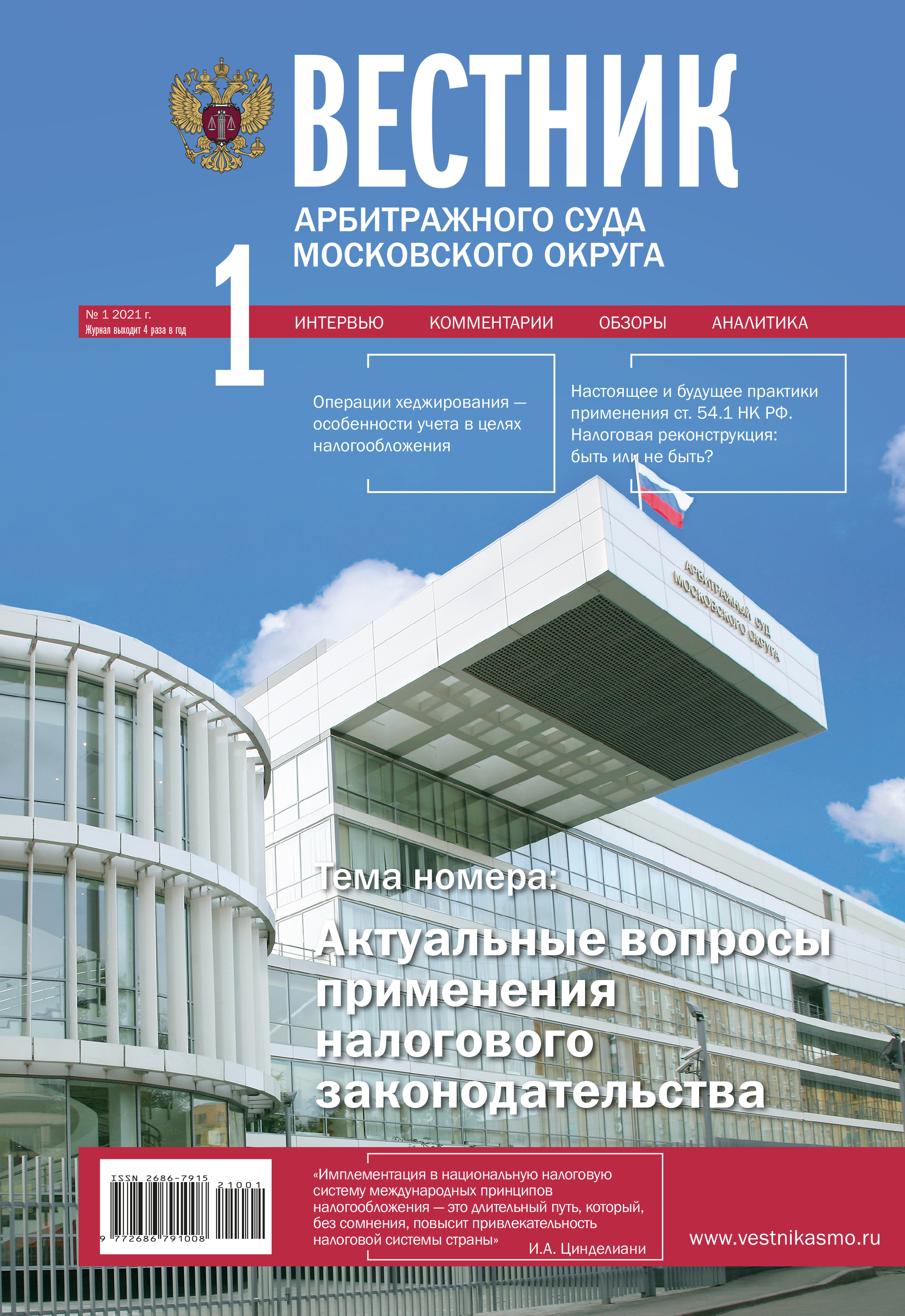Courts News
News of Moscow District Courts
Interview of the issue
I.A. Tsindeliani. “Implementing International Taxation Principles into the National Tax System Is a Long Way to Go, Which Will Undoubtedly Increase the Attractiveness of Our System”
Topicality
Limits of Tax Authorities’ Powers in the Framework of the Right to Secrecy of Telephone Conversations
Analytics: Topical Issues of Tax Legislation Application
M.A. Basos
Hedging Transactions — Peculiarities of Accounting for Taxation Purposes
The article focuses on the application of tax law provisions that regulate the taxation of income during hedging transactions. On the example of one arbitrazh (commercial) case the author analyzes the conditions that enable taxpayers to take into account the income and expenses associated with the objects of hedging, in determining the tax base for corporate income tax purposes.
Keywords: hedging operations, risk insurance, derivatives, forward, forward contract, underlying asset, tax law, income tax, taxpayer
DOI: 10.46279/ASMO.2021.49.57.001
P.N. Zyukov
Present and Future of Article 54.1 of the Russian Tax Code. Tax Reconstruction: To Be or not to Be?
The author considers basic aspects of application of Article 54.1 of the Russian Tax Code. The meaning of this norm and the basic directions of tax policy concerning its application, particularly the variability of the position of the Federal Tax Service of Russia concerning the application of its separate provisions, are revealed. The conclusions of the Federal Tax Service, stated in the Letter No. BVВ-4-7/3060@ “On the Practice of Application of Article 54.1 of the Tax Code of the Russian Federation” dated March 10, 2021, are analysed and summarised. In addition, the author draws attention to the process of shaping the approach of the courts and supervisory authorities to the possibility of using the calculation method (tax reconstruction method). The author compares approaches of courts before and after the adoption of the mentioned article, its correlation with the RF Supreme Arbitrazh (Commercial) Court Plenary Resolution from October 12, 2006, No. 53, and also considers new positions of the Supreme Court, which hadn’t been worked out before the article 54.1 was adopted despite the necessity to create methodological basis to consider disputes connected with tax abuses connected with technical organizations.
Keywords: Article 54.1 of the Russian Tax Code, tax benefit, tax disputes, tax reconstruction
DOI: 10.46279/ASMO.2021.29.49.002
P.S. Alpatov
Literal and Teleological Approaches to Interpretation of Norms on Investment Tax Relief in the Practice of Commercial Courts
The author focuses on methods of interpreting legal norms chosen by judges when resolving the disputes related to the state support of capital investments. The author examines the advantages and disadvantages of literal and teleological methods of interpretation in cases of investment benefits. In conclusion the author states the necessity to combine both methods and the priority of grammatical interpretation.
Keywords: capital investments, tax benefits, investment activity
DOI: 10.46279/ASMO.2021.80.81.003
M.A. Trifonova
Сhallenging the Tax Authority’s Refuse to Provide Subsidies Aimed at Supporting Small Businesses in the Context of the Spread of a New Coronavirus Infection in Commercial Courts
The author investigates the main problems faced by Russian arbitrazh (commercial) courts when considering applications of small business entities to challenge the tax authorities’ refusal to provide them financial help in times of a decline in consumer demand due to restrictive measures introduced in spring 2020 and determining the possibility or impossibility of awarding such subsidies. The author focuses on (i) formal and informal judicial approach to the assessment of compliance of the taxpayer’s actual activities with the conditions for classifying such activities as the most affected industries; (ii) changes in the number of employees of a small business entity during the period of payment of the subsidy. In addition, the author has analyzed the currently available court practice on consideration of such claims: the application of the pre-trial order of settlement of these disputes and the legality of the requirements to establish the fact of a certain type of economic activity.
Keywords: tax authority, provision of subsidies to small and medium business entities
DOI: 10.46279/ASMO.2021.19.79.004
L.M. Narinyan
The Role of Public Interests in Setting Goals of the State Tax Policy
The very wide use of the concepts of “public interest” and “balance of private and public interests” in judicial practice has motivated the author to analyze them, to identify their interrelation and impact on the functioning of the tax system. The article examines the understanding of the category of “interest” as applied to public legal relations and reveals the need for its disclosure through the mechanism of goal setting.
Keywords: public interest, state interest, goal setting, state, taxation, tax system, society, taxpayer
DOI: 10.46279/ASMO.2021.39.99.005
A.A. Solovyov
Some Innovations in the Tax Legislation of the French Republic
The author considers how the French Republic is improving certain provisions of tax legislation and reflecting in it main trends and current problems. The novelties of the French tax legislation, connected with the development of the digitalization processes and electronic circulation of documents, application of artificial intelligence in the sphere of tax control, formation of the institute of a single taxable person and also overcoming of the crisis caused by the pandemic COVID-19 are examined.
Keywords: tax legislation, foreign experience, French Republic, tax control, COVID-19 pandemic, digitalization
DOI: 10.46279/ASMO.2021.92.32.006
Analytics: Open Tribune
V.P. Sorokin
Participation of the Commercial Court in the Formation of the Arbitration Commissions as One of the Directions of Judicial Assistance to Arbitration
The article is devoted to current issues of judicial assistance to arbitration as an alternative form of dispute resolution. The circumstances and conditions of such assistance on the part of commercial court are considered. The qualification requirements to the arbitrator are investigated, and attention is given to the principle of independence which is the most important for choosing the arbitrator and which is also the basic principle of commercial and civil legal proceedings. The author notes that the procedure for the implementation of the commercial court functions to facilitate arbitration proceedings, established in the Russian Arbitrazh (Commercial) Procdure Code, complies with the provisions of the Federal Law of December 29, 2015, No. 82-FZ “On Arbitration in the Russian Federation”. Special emphasis is placed on the provision of the Law regulating the responsibility of arbitratiors and arbitral tribunals for the implementation of their decisions. Finally, the principles of formation of the arbitration commission in the legislation of foreign countries are considered.
Keywords: judicial assistance in arbitration proceedings, main directions of judicial assistance, court participation in forming the arbitration commission, qualification requirements imposed on the arbitrator, preventing arbitrators from exercising their powers circumstances
DOI: 10.46279/ASMO.2021.32.22.007
O.A. Lodyanov
Acceptance by Creditor in the System of Legal Facts
The article analyses the legal essence of creditor’s acceptance of performance by the example of acceptance under the work and labor contract. The author declares the impermissibility of uniting in one legal institute the reception of a benefit provided by the debtor, on the one hand, and the acceptance itself (creditor’s estimation of the result of debtor’s performance), on the other hand. Acceptance implies the assessment of the debtor’s work as the completed fulfillment of the obligation, which entails the termination of the obligation by virtue of the substance of the relationship, but does not exclude the debtor’s liability for improper performance. Acceptance of improper fulfillment terminates the performed obligation. The analysis allows us to conclude that the acceptance is a kind of legal deeds that contain a legally significant expression of will. The essence of expression of will consists in a certain estimation of execution which is obligatory for all parties of obligation — both the creditor and the debtor.
Keywords: acceptance of fulfillment, fulfillment of obligation, acceptance of work, legal act, transaction
DOI: 10.46279/ASMO.2021.29.21.008
A.A. Glushetskiy
Forms of Complex Reorganization: A Sought-After Innovation Does not Correlate Well with the Nature of a Legal Entity
On the example of reorganization in the form of separation with simultaneous incorporation, a new phenomenon for domestic corporate practice is considered-complex forms of reorganization, which represent a symbiosis of several classical forms of reorganization of a legal entity: separation with accession or merger, separation with accession or merger. They are in demand in practice, since they simplify the structuring of assets and liabilities of legal entities, in particular, they allow combining partial and universal succession in one process, and allow succession between existing legal entities without their termination and the creation of new ones. However, these forms contain components that do not correspond well to the nature of the legal entity and its reorganization: a conditionally created “transit” legal entity, its phantom securities that do not appear in circulation, a phantom succession of a conditionally existing legal entity, etc. An analysis of these phenomena is given and suggestions are made for their possible elimination.
Keywords: reorganization, forms of complex reorganization, intermediate legal entity, phantom securities, separation with simultaneous incorporation, succession
DOI: 10.46279/ASMO.2021.59.86.009
A.A. Kuznetsov
Voting of Shareholders on Reorganisation
The most basic and simple way for shareholders to protect their interests in a reorganisation is to be able to participate in the general meeting at which the reorganisation is to be decided. At such a meeting, a person will not only be able to vote, but also to ask questions about certain aspects of the reorganisation and also to give their views on the transaction. Although this cannot protect participants (shareholders) from a decision of the meeting infringing on their rights, but it does create some procedural guarantee of transparency and legitimacy of the process of making such a decision. The article includes a study of foreign doctrine on the issue under discussion and an analysis of Russian law.
Keywords: company law, reorganisation of companies, protection of shareholders
DOI: 10.46279/ASMO.2021.27.66.010
Scientific Advisory Council
Protocol Decision No. 2 of the Presidium of the Moscow District Commercial Court


